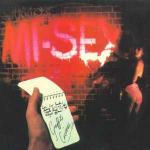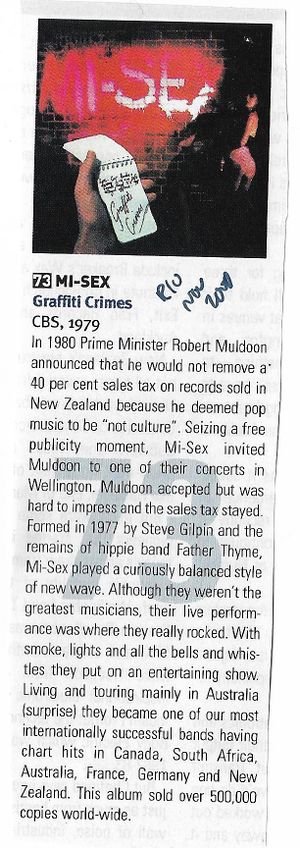Difference between revisions of "Mi-Sex"
Thedugganaut (Talk | contribs) m |
|||
| (2 intermediate revisions by one other user not shown) | |||
| Line 1: | Line 1: | ||
[[image:Graffiti.jpg|right|thumb|''Graffiti Crimes'' cover art]] | [[image:Graffiti.jpg|right|thumb|''Graffiti Crimes'' cover art]] | ||
| + | [[image:RIP IT UP - Mi-Sex Graffiti Crimes, Nov 2000.jpg|right|thumb|''Graffiti Crimes'' retrospective review, Rip It Up (2000)]] | ||
''Mi-Sex'' evolved out of the Hamilton band [[Father Thyme]], via [[Fragments of Time]], and included Hamiltonian [[Don Martin]].<br> | ''Mi-Sex'' evolved out of the Hamilton band [[Father Thyme]], via [[Fragments of Time]], and included Hamiltonian [[Don Martin]].<br> | ||
| − | The frontman for ''Mi-Sex'' was Wellingtonian ''Steve Gilpin'', the winner of the television contest ''New Faces'' in 1972. In the early 1970s he toured the country performing "cabaret style" in provincial centres, including songs such as "Bridge over Troubled Waters", "Johnny B Goode" and "Whole Lotta Shakin" in his repertoire. ''Gilpin'' first met members of ''Father Thyme'' in 1976 when he saw them play in Palmerston North. In 1977, after ''Father Time'' disbanded, Gilpin joined with the bands [[Alan Moon]] (organ) and [[Don Martin]] (bass), along with [[Phil Smart]] (drums) and ''Kevin Stanton'' (guitar), calling themselves [[Fragments of Time]], and remained based in Hamilton. The band evolved in its make-up, with ''Moon'' replaced by Invercargill/Wellingtonian ''Murray Burns'', and ''Smart'' was briefly replaced by ''Steve Osbourne'', followed by ''Richard Hodgkinson''. This lineup, now based in Wellington, debuted in 1978 as ''Mi-Sex''. By this time they had | + | The frontman for ''Mi-Sex'' was Wellingtonian ''Steve Gilpin'', the winner of the television contest ''New Faces'' in 1972. In the early 1970s he toured the country performing "cabaret style" in provincial centres, including songs such as "Bridge over Troubled Waters", "Johnny B Goode" and "Whole Lotta Shakin" in his repertoire. ''Gilpin'' first met members of ''Father Thyme'' in 1976 when he saw them play in Palmerston North. In 1977, after ''Father Time'' disbanded, Gilpin joined with the bands [[Alan Moon]] (organ) and [[Don Martin]] (bass), along with [[Phil Smart]] (drums) and ''Kevin Stanton'' (guitar), calling themselves [[Fragments of Time]], and remained based in Hamilton. The band evolved in its make-up, with ''Moon'' replaced by Invercargill/Wellingtonian ''Murray Burns'', and ''Smart'' was briefly replaced by ''Steve Osbourne'', followed by ''Richard Hodgkinson''. This lineup, now based in Wellington, debuted in 1978 as ''Mi-Sex''. By this time they had evolved from long-haired progressive rockers to short-haired new-wavers. <br> |
| − | ''Mi-Sex'' moved to Sydney in late 1978. Based here they released an album in 1979, [[Graffiti Crimes]], which included the [[Fragments of Time]] song ''Camera Kazi''. In 1979 they also released the singles [[But You | + | ''Mi-Sex'' moved to Sydney in late 1978. Based here they released an album in 1979, [[Graffiti Crimes]], which included the [[Fragments of Time]] song ''Camera Kazi''. In 1979 they also released the singles [[But You Don't Care]] and [[Computer Games]]. [[Computer Games]] went to number 1 on the Australian charts (#5 in NZ), and was followed by a performance on the steps of the Sydney Opera House at an event called "Concert of the Decade" in front of 160,000 people. On the back of a North American tour, "Computer Games" also went to number 2 on the Canadian charts. <br> |
| − | Further releases followed, including the albums [[Space Race]] (1980), [[Shanghaied]] (1981) and [[Where Did They Go?]] (1984), and the singles [[People]] (1980), [[Falling in and Out]] (1981), [[Missing Person]] (1981), [[ | + | Further releases followed, including the albums [[Space Race]] (1980), [[Shanghaied]] (1981) and [[Where Did They Go?]] (1984), and the singles [[People]] (1980), [[Falling in and Out]] (1981), [[Missing Person]] (1981), [[Castaway]] (1982) and [[Blue Day]] (1982). The band split up after their final album, [[Where Did They Go?]], failed to chart in the United States. |
[[category:Hamilton Related Bands]] | [[category:Hamilton Related Bands]] | ||
Latest revision as of 22:02, 17 June 2019
Mi-Sex evolved out of the Hamilton band Father Thyme, via Fragments of Time, and included Hamiltonian Don Martin.
The frontman for Mi-Sex was Wellingtonian Steve Gilpin, the winner of the television contest New Faces in 1972. In the early 1970s he toured the country performing "cabaret style" in provincial centres, including songs such as "Bridge over Troubled Waters", "Johnny B Goode" and "Whole Lotta Shakin" in his repertoire. Gilpin first met members of Father Thyme in 1976 when he saw them play in Palmerston North. In 1977, after Father Time disbanded, Gilpin joined with the bands Alan Moon (organ) and Don Martin (bass), along with Phil Smart (drums) and Kevin Stanton (guitar), calling themselves Fragments of Time, and remained based in Hamilton. The band evolved in its make-up, with Moon replaced by Invercargill/Wellingtonian Murray Burns, and Smart was briefly replaced by Steve Osbourne, followed by Richard Hodgkinson. This lineup, now based in Wellington, debuted in 1978 as Mi-Sex. By this time they had evolved from long-haired progressive rockers to short-haired new-wavers.
Mi-Sex moved to Sydney in late 1978. Based here they released an album in 1979, Graffiti Crimes, which included the Fragments of Time song Camera Kazi. In 1979 they also released the singles But You Don't Care and Computer Games. Computer Games went to number 1 on the Australian charts (#5 in NZ), and was followed by a performance on the steps of the Sydney Opera House at an event called "Concert of the Decade" in front of 160,000 people. On the back of a North American tour, "Computer Games" also went to number 2 on the Canadian charts.
Further releases followed, including the albums Space Race (1980), Shanghaied (1981) and Where Did They Go? (1984), and the singles People (1980), Falling in and Out (1981), Missing Person (1981), Castaway (1982) and Blue Day (1982). The band split up after their final album, Where Did They Go?, failed to chart in the United States.

